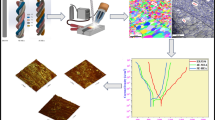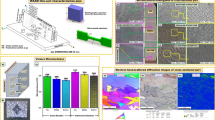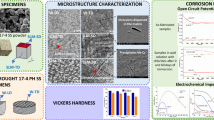Abstract
Sensitivity to stress corrosion cracking is the limiting factor for service life in corrosive environments. Choice of welding parameters and electrodes affects stress-corrosion fracture toughness of steel welds through basic microstructure and fracture mechanisms.
Similar content being viewed by others
References
B. F. Brown, Met. Rev., 13 (129) (Dec. 1968) pp. 171–183
Specification No. E8-69, 1975 Annual Book of ASTM Standards, Part 10, pp. 90–110
B. F. Brown, Materials Research and Standards, 6 (3) (1966) pp. 129–133
C. D. Beachem and G. R. Yoder, Met. Trans., 4 (1973) pp. 1145–1153
Fractography and Atlas ofFractographs, Metals Handbook, 8th ed., Vol. 9, pp. 82–83; 1974: Am. Soc. Metals, Metals Park Oh.
T. G. Gooch, Welding Journal, Research Supplement, 53 (1974) pp. 287s–298s
Author information
Authors and Affiliations
Additional information
This paper was presented at a symposium on the subject “Physical Metallurgy of Weldments” sponsored by the TMS Ferrous Metallurgy Committee at the TMS Fall Meeting held in Niagara Falls, N.Y., September 1976. Chairman was Dr. Ronald P. Simpson, Westinghouse Electric Corp., Pgh., Pa.
Edward A. Metzbower received a BS from Loyola College (Baltimore, Md) and an MES and PhD from Johns Hopkins University. He has been employed at the Naval Research Laboratory since 1967. He is now a supervisory metallurgist and head of the Welding Metallurgy Section, and is interested in correlating behavior, properties, and structures in welds, especially laser welds.
Joseph Stoop was a research metallurgist with the Engineering Materials Division of the Naval Research Laboratory before his retirement in 1977. He received his MS in metallurgy from Penn State in 1940 and an MS from Stevens Institute of Technology in 1948. He was employed by the Curtiss Propeller Division of Curtiss Wright Corporation from 1940–1955 and by the Naval Research Laboratory from 1955 until his retirement.
C. T. Fujii, a research chemist at the Naval Research Laboratory since 1958, received his PhD from the University of Hawaii in 1958. His research interests include localized corrosion processes such as pitting, crevice corrosion, stress-corrosion cracking, and corrosion fatigue of marine structural alloys. Dr. Fujii is Head of the Corrosion Mechanisms Section of the Metals Performance Branch of the Material Science and Technology Division.
Frances W. Fraser received a BS from Rutgers University with a major in chemistry. She joined the staff at Naval Research Laboratory in 1968 as an analytical chemist in the materials area. Since 1974, she has been a member of the Welding Metallurgy Section in the Materials Science and Technology Division. Her current research is concerned with fractography, metallography, and microseg-regation in high-strength low-alloy steels.
Rights and permissions
About this article
Cite this article
Metzbower, E.A., Stoop, J., Fujii, C.T. et al. Metallurgical Factors Influencing Stress Corrosion Cracking of High-Strength Ni-Cr-Mo Steel Welds. JOM 30, 15–20 (1978). https://doi.org/10.1007/BF03354383
Published:
Issue Date:
DOI: https://doi.org/10.1007/BF03354383




